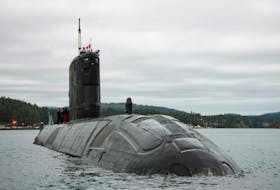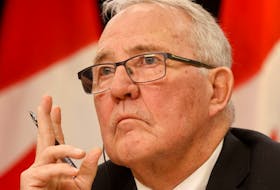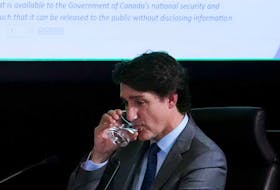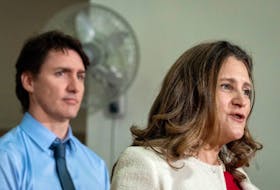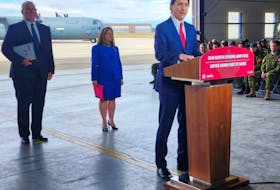When David Cameron became leader of the British Conservative Party in 2005, satirical magazine Private Eye took the opportunity to have some fun at his expense, running pictures of the youthful Cameron and then prime minister Tony Blair side by side under the headline: “World’s first face transplant a success.”
Cameron rejoiced in the tag “the heir to Blair”. Like the Labour prime minister, he dragged a reluctant party toward the political centre. The youthful Conservative was criticized by his own party’s right wing for going too far in embracing Blair’s social liberalism but the move was popular with voters and within five years he was prime minister.
In many ways, it was a blueprint for Canadian Conservatives, a guide on how to rid themselves of the “Nasty Party” accusation and rebrand as a confident, vigorous alternative to the Liberals.
It’s too bad then that the candidate who might have best played the Cameron role to Justin Trudeau’s Blair has decided against running.
Mark Mulroney – second son of former prime minister, Brian; brother of Ontario cabinet minister Caroline and CTV host Ben – may not have the highest of profiles, even around his own family’s Christmas dinner table. But those who have watched his development know that he would have been a serious contender for the leadership had he decided to run. Certainly, many of those who have ambitions to wear Andrew Scheer’s crown checked with Mulroney before proceeding with their plans.
“I’ve had so much nice commentary from some really smart people. But you have to trust your gut and this is not my time,” said the 40-year-old investment banker, who is expecting his fifth child in February.
The reaction on social media to rumours of his interest were predictable. “The Trudeaus and Mulroneys want to keep the oligarchy going,” said one person on Twitter.
But Mulroney recognizes his famous name would have been a challenge that would also have been a benefit. “I was raised in this game and understand politics. Scotty Bowman’s kids sit around talking about hockey. We talked politics,” he said.
The Trudeaus and Mulroneys want to keep the oligarchy going
For those encouraging him to run, the name was the cherry on top – more importantly, he is smart, telegenic, personable and crucially, fluently bilingual.
There are a lot of names being thrown out as potential candidates but the acid test on participating in this contest is whether you can speak and listen to Canada’s citizens. There are 78 ridings in Quebec and another 10 outside it, where one third of the population speak French as their native tongue. A Conservative leader without French would likely find him or herself 88 seats down before a vote was counted.
Mulroney is out but on Wednesday Radio Canada reported Jean Charest, the former Progressive Conservative leader and later Quebec premier, is consulting with friends about running. The initial reaction among Conservatives I spoke with was skepticism – he’s been out of federal politics for more than 20 years and working in the private sector for seven, they pointed out, not to mention messy legal complications around corruption trials in Quebec that centre on his time as premier.
But, unlikely as it may seem, this one could have legs, according to one well-connected source. “It would be an earthquake in the race,” he said. “Who else has his kind of experience?”
The snark on Twitter is that the party he used to lead no longer exists, which is true. But that, in part, may be to his advantage. The Conservative Party needs a curative when it comes to national unity, climate change and Canada’s place in the world – issues that are said to motivate Charest.
Even though he was first elected in 1984 and was in Brian Mulroney’s cabinet at the age of 28, he is still only 61. He would also, of course, have appeal in French-speaking Canada.
Whether he runs or not remains to be seen. No-one is truly committed, in part because the party has not released the rules and timing of the contest, or even appointed a leadership election organizing committee. In 2017, candidates were required to submit nomination forms signed by 300 party members from at least 30 ridings in seven provinces. There was a $100,000 entrance fee and a $5 million spending limit. One member of the last leadership organizing committee said the entrance fee should be raised to $250,000 this time, to discourage frivolous candidates.
Former interim leader Rona Ambrose has topped most polls as the most likely replacement for Scheer. People close to her suggest she has been encouraged by the support and she is being urged to run by senior Conservatives, including Stephen Harper. Yet even her strongest supporters concede her French is not currently strong enough.
Former justice minister Peter MacKay is said to be organizing, though Charest’s entry would be an impediment, as is former veterans affairs minister Erin O’Toole.
Ontario MP Pierre Poilievre is making calls to his colleagues and is generating some excitement – he’s from Alberta, is bilingual, is widely regarded as the best parliamentarian in the caucus and his campaign will likely be run by former national campaign director, Jenni Byrne. “He’s a serious contender. He’s matured,” said one former cabinet minister.
Vince Guzzo, the entrepreneur who owns cinemas and restaurants across Quebec and appears as an investor in Dragon’s Den, is said to be serious about running.
Other Quebecers said to be kicking les pneus include MP Gerard Deltell and Michael Fortier, the financier and former cabinet minister.
To beat Trudeau, the Conservatives need to project the same freshness and sense of purpose
With the exception of Charest, it’s not a field likely to inspire fear in Liberals or excitement in the non-aligned. Most of the men in question have been on the political scene for decades, which suggests there could be an absence of original thinking and energy.
To beat Trudeau or his successor, the Conservatives should not become carbon copies of the Liberals but they do need to project the same freshness and sense of purpose that the Liberal leader brought to his party.
The Conservatives under Harper eschewed sweeping visions and grand reforms, seeing them as toxic to practical politics. Moderation and suspicion of government over-reach have been the natural default positions of modern conservatism since Edmund Burke’s criticism of the French revolution. But those insights could be applied to solve the problems of the 2020s – as noted by Conservative thinker Sean Speer in his writing on those left behind by the digital economy.
There has to be a better reason to vote Conservative than a pledge to restore the children’s fitness tax credit. Mulroney would have been a good foil to Trudeau. In his absence, who will emerge as the “heir to Trudeau” and ensure the Conservatives are not reduced to a Western regional rump?
• Email: [email protected] | Twitter: IvisonJ
Copyright Postmedia Network Inc., 2019

